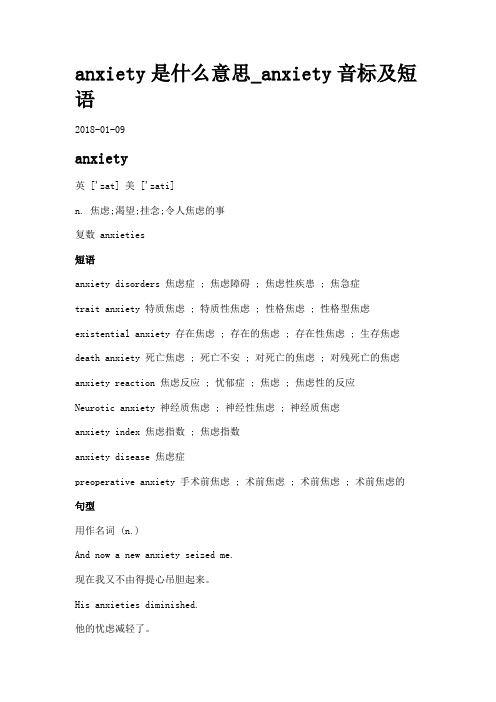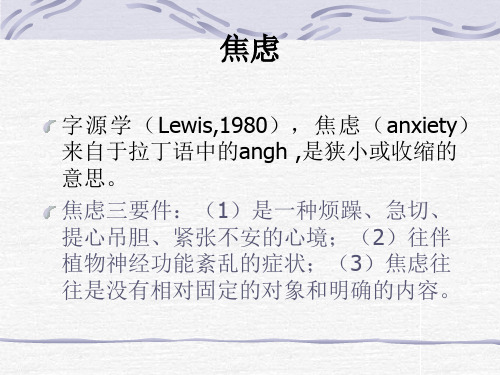Anxiety
- 格式:pptx
- 大小:1.70 MB
- 文档页数:21

anxiety 单词:
anxiety :n. 焦虑,忧虑;令人焦虑的事;渴望;焦虑症。
常见短语:
1、anxiety disorder焦虑症:各种焦虑症(如恐慌症、强迫症、恐惧症或广泛性焦虑症)等疾病,焦虑是其主要特征。
2、anxiety for sth 渴望。
3、test anxiety 考试焦虑:在考试前或考试期间产生的害怕心理,导致身心出现一系列不良反应,常表现为紧张焦虑、头晕出汗、思维紊乱、记忆模糊、反应迟钝、精神不集中等症状。
在中国的高考前易患此病。
例句:
1、Her voice was full of anxiety.
她的声音饱含焦虑。
2、Anxiety can be caused by lack of sleep.
睡眠不足可能导致焦虑。
3、He closed his eyes and lay still, trying to purge his mind of anxiety.
他闭上眼睛躺着不动,试图清除心里的焦虑。
4、This is a sign of anxiety.
这是焦虑的一个标志。

anxiety音译读法Anxiety, in Pinyin, is pronounced as "An-xi-e-ti" (ænˈzaɪəti) in Mandarin Chinese. Anxiety, or "焦虑" (jiaolǜ) in Chinese, refers to a feeling of worry, fear, or unease about something with an uncertain outcome. It is a common emotion experienced by many people at different times in their lives. In this article, we will explore the concept of anxiety, its causes, symptoms, and possible treatment options.Causes of AnxietyAnxiety can be caused by various factors, including genetic predisposition, traumatic experiences, and environmental factors. Some people may be more prone to anxiety due to their genetic makeup. If their parents or close relatives have a history of anxiety disorders, they may have an increased risk of developing anxiety themselves.Traumatic experiences, such as accidents, abuse, or the loss of a loved one, can also trigger anxiety. These experiences may leave a lasting impact on a person's psyche, resulting in anxiety symptoms that persist long after the initial event.Environmental factors, such as high-stress levels, social pressure, or a demanding work environment, can contribute to the development of anxiety. Living in a constantly stressful or challenging environment can put a person's mental health at risk and lead to the onset of anxiety symptoms.Symptoms of AnxietyThe symptoms of anxiety can vary from person to person and may manifest differently depending on the individual's age, personality, and circumstances. Some common symptoms of anxiety include:1. Excessive worry: Feeling constantly worried or on edge, even when there is no immediate threat or danger.2. Restlessness: Difficulty sitting still or feeling the need to constantly move or fidget.3. Insomnia or sleep disturbances: Difficulty falling asleep, staying asleep, or experiencing restless sleep.4. Irritability: Being easily irritated or having a short temper.5. Difficulty concentrating: Feeling easily distracted or having trouble focusing on tasks.6. Muscle tension: Tightness or soreness in muscles, often due to prolonged periods of stress.7. Panic attacks: Sudden and intense episodes of fear or panic, often accompanied by physical symptoms such as rapid heartbeat, shortness of breath, or chest pain.8. Social withdrawal: Avoiding social situations or feeling uncomfortable in social settings due to fear of judgment or criticism.9. Physical symptoms: Anxiety can also manifest as physical symptoms such as headaches, stomachaches, nausea, or dizziness.These symptoms can range from mild to severe and may significantly impact a person's daily functioning and overall quality of life.Treatment for AnxietyFortunately, there are various treatment options available for individuals suffering from anxiety. The most common forms of treatment include therapy (such as cognitive-behavioral therapy), medication, and lifestyle changes:1. Therapy: Cognitive-behavioral therapy (CBT) is a widely used form of therapy for treating anxiety. It helps individuals identify and change negative thought patterns and behaviors that contribute to their anxiety. CBT also teaches coping skills and relaxation techniques to manage anxiety symptoms.2. Medication: In some cases, medication may be prescribed to help manage anxiety symptoms. Antidepressants, such as selective serotonin reuptake inhibitors (SSRIs), are often used to treat anxiety disorders. These medications work by altering the balance of chemicals in the brain that are associated with mood regulation.3. Lifestyle changes: Making certain lifestyle changes can also help reduce anxiety symptoms. These may include regular exercise, adequate sleep, a healthy diet, mindfulness practices, and stress-management techniques. Engaging in activities that bring joy orrelaxation, such as hobbies or spending time with loved ones, can also help alleviate anxiety.It is important to note that treatment for anxiety should be individualized and tailored to each person's needs. What works for one person may not work for another, so it is crucial to seek professional help and guidance when dealing with anxiety.ConclusionIn conclusion, anxiety is a common emotion experienced by many individuals at some point in their lives. It can be caused by various factors, including genetics, traumatic experiences, and environmental factors. Symptoms of anxiety can range from excessive worry to panic attacks, and they can significantly impact a person's daily functioning and well-being. However, with the right treatment and support, anxiety can be managed effectively. Therapy, medication, and lifestyle changes are common treatment options for anxiety. If you or someone you know is struggling with anxiety, it is important to seek professional help and support to address the condition and improve overall mental health.。

anxiety是什么意思_anxiety音标及短语2018-01-09anxiety英 ['zat] 美 ['zati]n. 焦虑;渴望;挂念;令人焦虑的事复数 anxieties短语anxiety disorders 焦虑症 ; 焦虑障碍 ; 焦虑性疾患 ; 焦急症trait anxiety 特质焦虑 ; 特质性焦虑 ; 性格焦虑 ; 性格型焦虑existential anxiety 存在焦虑 ; 存在的焦虑 ; 存在性焦虑 ; 生存焦虑death anxiety 死亡焦虑 ; 死亡不安 ; 对死亡的焦虑 ; 对残死亡的焦虑anxiety reaction 焦虑反应 ; 忧郁症 ; 焦虑 ; 焦虑性的反应Neurotic anxiety 神经质焦虑 ; 神经性焦虑 ; 神经质焦虑anxiety index 焦虑指数 ; 焦虑指数anxiety disease 焦虑症preoperative anxiety 手术前焦虑 ; 术前焦虑 ; 术前焦虑 ; 术前焦虑的句型用作名词 (n.)And now a new anxiety seized me.现在我又不由得提心吊胆起来。
His anxieties diminished.他的忧虑减轻了。
Her anxieties deepened with each passing day.她的忧虑与日俱增。
用法n.(名词)anxiety的基本意思是“焦虑,着急(的情绪)”,指因悬而未决或吉凶难卜的事而引起的焦虑与紧张不安,也可指因即将到来的灾难或不幸而产生的恐惧与忧虑。
anxiety作“令人着急、焦虑的事”解,是可数名词,引申可表示为某事焦虑,常译成“渴望,热望”,是不可数名词。
anxiety后可接由that引导的同位语从句,从句中的谓语动词多用“should+动词原形”, should有时可省略。
词汇辨析anxiety,worry,care,concern这些名词均含“焦虑、关心”之意。


焦虑(Anxiety)真的有那么可怕?觉着背单词无趣,就换种方式吧!不妨通过看文章来积累英语词汇。
乐知英语小站(/)里有很多和工作生活学习相关的文章,中英结合,可读性强,一些需要特别注意的词、短语、句子都给大家标注了英文。
一篇文章看下来,能熟悉很多高频词汇。
要是文章多看一两次,这些词汇就能记住啦。
言归正传,一起来读文章。
对于实在记不住的单词,建议大家做下笔记哦。
不知是什么原因,也许是物质生活条件越来越好导致人们的注意力更多集中在精神愉悦的层面,一丁点情绪上的波动、负性事件带来的应激性反应就会被贴上心理有问题的标签、需要看心理医生。
另一方面,媒体对一些有天赋的各行业领袖心理疾病的报道又让得这些病成为一种高端的人生体验,很难再回到对它们理性、公正的判断。
就像焦虑——哪来那么多病?!Anxiety = Struggle = Growth (sometimes)People in their comfort zone are generally happier than those who live in a state of heightenedanxiety most of the time——总是在舒适区里保持一种life routine/pattern的人当然比喜欢突破和变革的人更少焦虑。
(heightened:升高的,注意构词,英语动词里有一些是以形容词+en为结尾表示,这里再加ed成为过去分词,又变为形容词,还有比如lessen)But, without discomfort(dis-comfort:dis前缀,表反义), there can be no growth. 绝对的杜绝焦虑也就意味着绝对的生活平稳、目标实现、没有烦恼之事。
如果以金钱论,亿万富翁尚且每天定一个小目标刺激自己,更何况确实面临生活压力的普通人。
So there is a state called optimal (最优、最理想的)anxiety, and people who want to experience growth have to endure (忍受;endurable:耐力持久的)some anxiety.如何控制这个度是关键:Choose things that are 50% familiar to you.这就好比求职,重新进入一个与自己求学和以前工作经历完全不相关的行业,当然会带来很大的非正向焦虑和压力感,所以去尝试那些自己一半熟悉一半陌生的领域大概是最好的状态。

有关焦虑作文英语的词汇Title: Understanding Anxiety: Exploring Key Vocabulary。
Introduction:Anxiety is a prevalent mental health condition characterized by feelings of worry, fear, and unease. Understanding the vocabulary associated with anxiety is crucial for effectively communicating about this topic. In this essay, we will explore key English vocabulary relatedto anxiety.1. Anxiety Disorders:Anxiety disorders encompass a range of conditions, including generalized anxiety disorder (GAD), panic disorder, social anxiety disorder (SAD), and specific phobias. These disorders involve excessive worry and fear that can interfere with daily life.2. Symptoms:Symptoms of anxiety may include palpitations, sweating, trembling, feelings of impending doom, and gastrointestinal distress. These physical and psychological symptoms can vary in intensity and duration.3. Triggers:Triggers are stimuli or situations that provoke anxiety reactions. Common triggers include stress, trauma, specific phobias, social situations, and major life changes.4. Coping Mechanisms:Coping mechanisms are strategies individuals use to manage anxiety. These may include deep breathing exercises, mindfulness techniques, physical activity, and seeking support from friends, family, or mental health professionals.5. Rumination:Rumination refers to the repetitive and intrusive thoughts associated with anxiety. Individuals may dwell on past or future events, leading to heightened feelings of distress and worry.6. Avoidance Behaviors:Avoidance behaviors involve avoiding situations or stimuli that trigger anxiety. While this may provide temporary relief, it can reinforce anxiety over the long term by preventing individuals from confronting their fears.7. Comorbidity:Comorbidity refers to the presence of two or more coexisting conditions. Anxiety disorders frequently co-occur with other mental health conditions, such as depression, substance use disorders, and eating disorders.8. Cognitive Distortions:Cognitive distortions are irrational thoughts that contribute to anxiety. Examples include catastrophizing (expecting the worst possible outcome), black-and-white thinking, and overgeneralization.9. Exposure Therapy:Exposure therapy is a treatment approach used to reduce anxiety by gradually exposing individuals to feared stimuli or situations in a controlled manner. This helps desensitize them to their triggers over time.10. Self-Care:Self-care practices are essential for managing anxiety. This may involve maintaining a healthy lifestyle, practicing relaxation techniques, setting boundaries, and engaging in activities that promote well-being.11. Medication:Medications such as selective serotonin reuptakeinhibitors (SSRIs), benzodiazepines, and beta-blockers may be prescribed to alleviate symptoms of anxiety. However, medication should be used in conjunction with therapy and other coping strategies.12. Mindfulness:Mindfulness involves paying attention to the present moment without judgment. Mindfulness-based interventions, such as meditation and yoga, can help individuals reduce anxiety by fostering a greater sense of awareness and acceptance.Conclusion:Understanding the vocabulary associated with anxiety is essential for fostering awareness, empathy, and effective communication about this common mental health condition. By familiarizing ourselves with these terms, we can better support individuals experiencing anxiety and work towards promoting mental well-being in our communities.。
anxiety的用法与搭配一、了解焦虑症及其症状现代社会的快节奏生活和竞争压力导致越来越多的人面临焦虑问题。
焦虑症是一种心理障碍,表现为持久且过度的担忧、紧张和恐惧感。
这种情绪状态可能对个人的日常功能造成明显的影响。
下面将介绍一些关于"anxiety"(焦虑)这一词汇的基本用法与搭配。
二、常见用法与搭配1. Anxiety as a noun"Noun + anxiety"结构表示某种特定类型或原因引起的焦虑。
例如:- Test anxiety (考试焦虑): Many students experience test anxiety before important exams.- Social anxiety (社交焦虑): People with social anxiety find it difficult to interact with others in social situations.- Separation anxiety (分离焦虑): Young children may exhibit separation anxiety when they are separated from their primary caregivers.2. Anxiety as an adjective"Anxiety + noun"结构表示某物引起的焦虑或紧张。
例如:- Anxiety disorder (焦虑障碍): Anxiety disorders are characterized by excessive and irrational worrying.- Anxiety symptoms (焦虑症状): Common anxiety symptoms include restlessness, irritability, and difficulty concentrating.3. Anxiety as a verb"To + verb"结构可用于表示焦虑或担忧的动作。
认识「焦虑」临床心理学家王佩英女士「焦虑」(anxiety) -- 一个心理学常用的专业词语,一些读者可能对这专业用词较为陌生。
焦虑可广泛地包括我们日常经历的惊慌、怕、担心、不安、紧张等心理状态,而大部份的学派都认为这状态包含主观性、不理性、不自觉等元素。
我们从一般生活经验得知,有人怕猫怕狗、有人怕上台演说、有人怕与异性相处、又有人畏高、怕坐电梯等。
面对这些较常见及具体的例子,旁人可能仍会为当事人的不合理恐慌而感到困惑,又或笑笑他们,又或寄予同情。
但若果你身边的人受到焦虑因扰,你的反应又如何?工作经验中接触不少受焦虑困扰的青年及儿童,他们的行为模式不像上列例子般清淅明确。
反之,隐藏的焦虑驱使他们把自己收藏起来,并可能发展出容易令人误解的行为。
案例一:问九唔应」,而且长时期无业空闲在家,家人认为她懒惰,不回应就等于「作对」。
后,了解到其实她自信心很低,有严重的社交焦虑(Social Phobia) 问题。
她不回应、不就业乃属逃避性的行为(avoidance),保护自己免受批评或身处暴露弱点的危机中。
案例二: 一位小学生,常被母亲投诉无心向学、行为倒蛋、脾气差、及说谎,其母常为此生气而打骂该孩子。
可想而知,母子关系变得越来越恶劣,母亲更扬言送他入寄宿学校,作为一种「解脱」。
个案背景资料显示,该孩子的父母多年前已离婚,其间居住安排常常更改,一时跟爸爸及后母同住,一时跟妈妈及异姓: 「你想唔要我之嘛! 」。
这句冲口而出的话,正显示这孩子最大的忧虑- 被双亲遗弃。
多年来居焦虑的人一般都会有各式各样的担心而未能清楚表达,甚至否定自己有任何担忧。
由于自信心低及自我形象差,很多时会作出过度保护自己的行为,例如: 拒绝任何新尝试、减少参与活动以避免与人接触、很少说话或话题只流于表面。
另一方面,焦虑的人很渴望重新得回操控感(sense of control),所以在有些情况下会不理性地坚持某些生活习惯(如严格地要求整洁),或要求他人绝对服从自己的方式去办事。